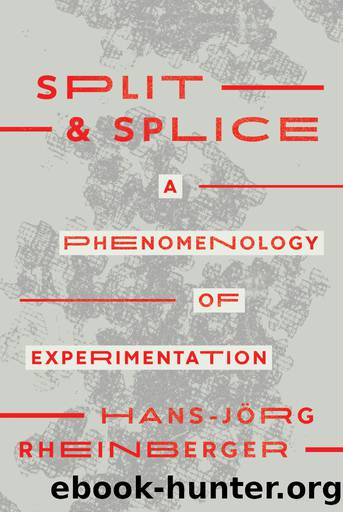Split and Splice: A Phenomenology of Experimentation by Hans-Jörg Rheinberger

Author:Hans-Jörg Rheinberger [Rheinberger, Hans-Jörg]
Language: eng
Format: epub
Tags: SCI000000 SCIENCE / General, SCI075000 SCIENCE / Philosophy & Social Aspects, SCI034000 SCIENCE / History, SCI028000 SCIENCE / Experiments & Projects
Publisher: University of Chicago Press
Published: 2023-04-21T00:00:00+00:00
Narrativity
Experimental systems embody and realize a narrative structure. It is based on the machinery that fills the space between the person wanting to know and the thing to be known, and it determines the dynamics of its generation of events. If the generation of knowledge is a subject in its own right at all, it is because of the historicity of the process that is being driven by the dynamics of these middle grounds. This machinery appears as a collective carrier beyond any immediate and unmediated confrontation of an ego with the world. Bachelard once characterized the situation like this: âIt is no longer about confronting a lonely spirit with an indifferent universe. From now on, one has to act from within that center in which the cognizant spirit is determined by the precise object of its effort to know, and from where the former in turn directs experimentation with ever greater precision.â9 That implies that a phenomenologically oriented epistemology striving to capture such a movement has to understand itself as a permanent historical task. The late Edmund Husserl formulated this insight as follows in his remarks in the âOrigin of Geometry,â a key text of historical epistemology: âCertainly the historical backward reference has not occurred to anyone; certainly theory of knowledge has never been seen as a peculiarly historical task. But this is precisely what we object to the past.â And he added: âThe ruling dogma of the separation in principle between epistemological elucidation and historical, even humanistic-psychological explanation, between epistemological and genetic origin, is fundamentally mistaken.â10 If one takes this coupling of history and epistemology seriously, it becomes impossible in principle to separate the things of knowledge from the conditions of their emergence. In a genuinely historical epistemology therefore, the âvital movement of the coexistence and the interweaving of original formations and sedimentation of meaningâ can only be grasped as a whole, no longer neatly separated from each other.11 László Tengelyi speaks in this context of a âconversion of Husserlâs phenomenology in its latest phase of development,â whose questions can no longer be encompassed in a purely intentional fashion.12 Or concisely, to quote Jacques Derrida, âintentionalityâ becomes âtraditionality.â13
In the historical movement of knowledge generation, in which the sedimentation of meaning increasingly takes the form of research technologies, the experimental order of things undergoes a permanent realignment. The result is that experimental systems not only narrate stories but also change them. In doing so, they not only open up toward the future, they also make their past appear in an ever-changing light. With every substantial new acquisition, the meaning and sense of the sedimented knowledge is subjected to a reconfiguration. The characteristic openness of scientific knowledge toward its future modification also provokes a redefinition of what lies in the pastâa movement that is inscribed in all historicity, but comes fully into its own in the space of the scientific. Thus, not only scientific questioning ahead, but also the âreturnâ or âregressive inquiryâ (die Rückfrage14), that genuine gesture of all things historic, is grounded in repetition and difference.
Download
This site does not store any files on its server. We only index and link to content provided by other sites. Please contact the content providers to delete copyright contents if any and email us, we'll remove relevant links or contents immediately.
| Electron Microscopes & Microscopy | Experiments & Projects |
| Measurement | Microscopes & Microsocopy |
| Scientific Instruments | Telescopes |
| Time | Methodology & Statistics |
Hands-On Genetic Algorithms with Python by Eyal Wirsansky (2020) by Unknown(4107)
Thing Explainer by Randall Munroe(3930)
The Elements by Theodore Gray(3051)
The Meaning of it All by Richard Feynman(2351)
Make by Mike Westerfield(2317)
Every Tool's a Hammer by Adam Savage(1941)
Science Experiments You Can Eat by Vicki Cobb(1877)
The Perfectionists by Sara Shepard(1819)
Martin Gardner's Science Magic by Martin Gardner(1730)
Raspberry Pi Electronics Projects for the Evil Genius (Tab) by Norris Donald & Norris Donald(1706)
Elephants on Acid by Boese Alex(1601)
Elephants on Acid: And Other Bizarre Experiments by Alex Boese(1588)
The Perfectionists by Simon Winchester(1581)
Handbook of Modern Sensors by Jacob Fraden(1576)
Synchrotron Light Sources and Free-Electron Lasers by Eberhard J. Jaeschke Shaukat Khan Jochen R. Schneider & Jerome B. Hastings(1557)
Tesla by Carlson W. Bernard(1523)
The Science of Food by Marty Jopson(1478)
The Meaning Of It All by Richard P. Feynman(1459)
125 Physics Projects for the Evil Genius by Silver Jerry(1453)
